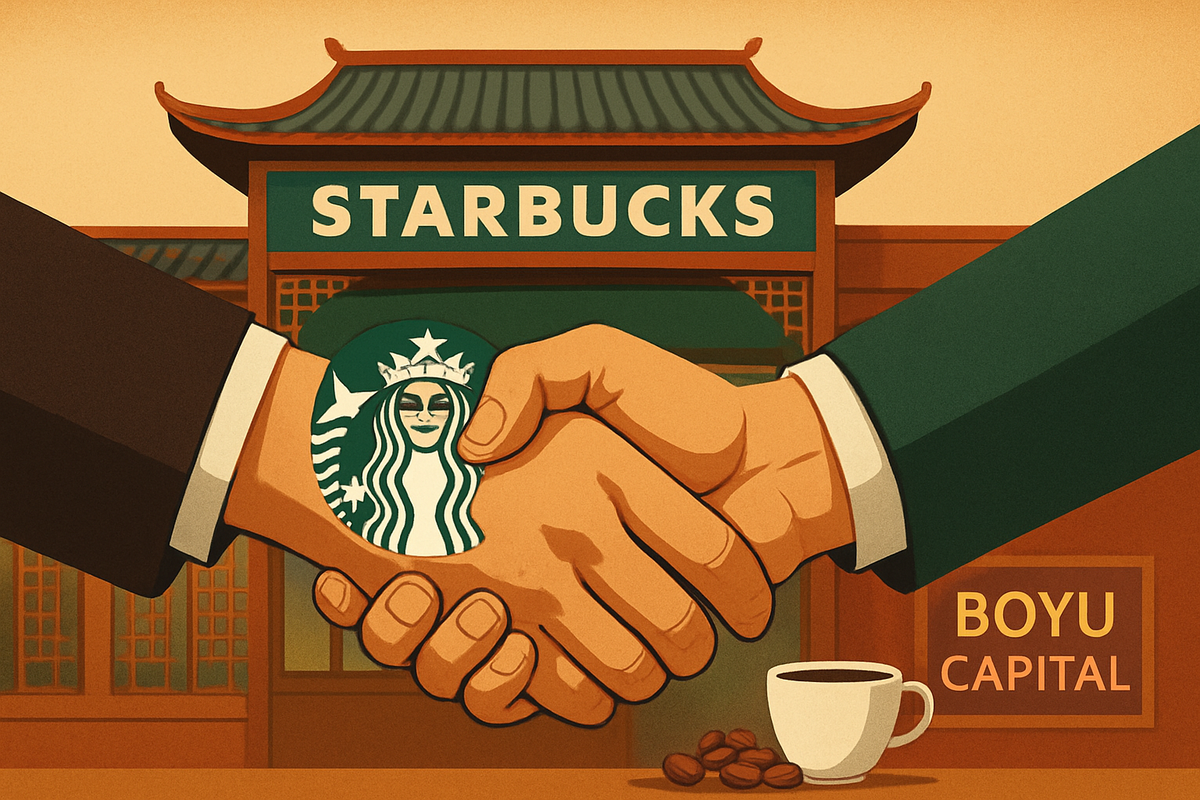
Shanghai, China – November 3, 2025 – Starbucks Corporation (NASDAQ: SBUX) saw its shares jump today following the announcement of a landmark joint venture for its extensive retail operations in China. The coffee giant revealed a strategic partnership with Boyu Capital, a prominent Chinese investment firm, which will see Boyu acquire a 60% stake in Starbucks' China retail business, while Starbucks retains a significant 40% interest. This pivotal move is designed to accelerate growth, enhance local relevance, and de-risk operations in what is Starbucks' second-largest and rapidly evolving market.
The market's immediate positive reaction underscores investor confidence in Starbucks' renewed strategy for the crucial Chinese market. The infusion of capital, coupled with Boyu Capital's deep local expertise, is being hailed as a shrewd maneuver to navigate intensifying competition and capitalize on the immense growth potential within China's burgeoning coffee culture. This partnership marks a significant recalibration of Starbucks' approach, aiming to solidify its leadership position and expand its footprint aggressively across the vast nation.
A Bold New Chapter for Starbucks in China
The agreement, announced on Monday, November 3, 2025, details Boyu Capital's acquisition of a 60% interest in Starbucks' retail operations in China, based on an enterprise value of approximately $4 billion. Starbucks will maintain a 40% stake and continue to own and license its brand and intellectual property to the new entity. The company estimates the total value of its China retail business to exceed $13 billion, reflecting the proceeds from the sale, the value of its retained interest, and long-term licensing economics. The joint venture's operations will remain headquartered in Shanghai, signaling continuity in local management and strategic direction.
This strategic pivot comes as Starbucks faces increasing competition from domestic players like Luckin Coffee, which have rapidly expanded and adapted to local consumer preferences. The timeline leading up to this moment has seen Starbucks grappling with the unique challenges of the Chinese market, from navigating complex regulatory landscapes to adapting to fast-changing consumer trends. By bringing in Boyu Capital, a firm renowned for its deep local knowledge and investment prowess, Starbucks is explicitly aiming to leverage this expertise to overcome these hurdles. The joint venture will take over the management of the existing 8,000 Starbucks coffeehouses across China with an ambitious vision to expand to as many as 20,000 locations over time, a clear indication of the aggressive growth trajectory planned. The finalization of this significant partnership is anticipated in Q2 FY2026, pending necessary regulatory approvals.
Key players in this transformative deal include Starbucks Corporation (NASDAQ: SBUX), represented by its executive leadership, and Boyu Capital, a leading Chinese private equity firm known for its investments in high-growth companies within China. This collaboration highlights a growing trend of Western multinational corporations partnering with local entities to navigate the complexities and capitalize on the opportunities within the Chinese market. Initial market reactions have been overwhelmingly positive, with Starbucks' stock rising 0.4% in after-hours trading immediately following the announcement, demonstrating investor optimism regarding the strategic benefits and potential for accelerated growth and de-risking of operations in the region.
Strategic Realignment: Winners and Losers in the Chinese Coffee Market
This joint venture is poised to create distinct winners and losers within the competitive landscape of the Chinese coffee market. Clearly, Starbucks (NASDAQ: SBUX) emerges as a significant potential winner. By partnering with Boyu Capital, Starbucks gains a strategic ally with unparalleled local market insights, operational expertise, and capital, which can significantly accelerate its expansion plans from 8,000 to a projected 20,000 stores. This move de-risks its substantial investment in China, allowing Starbucks to benefit from local knowledge while retaining a significant stake and brand licensing revenues. The cash infusion from the sale also provides financial flexibility for other global strategic initiatives or shareholder returns.
Boyu Capital, as the new majority stakeholder in Starbucks' China retail operations, is another clear winner. This acquisition grants Boyu a controlling interest in a leading, globally recognized brand with immense growth potential in one of the world's largest consumer markets. Their investment leverages their expertise in local market navigation and operational scaling, promising substantial returns as the joint venture expands. The partnership also enhances Boyu Capital's profile as a key player in China's consumer sector.
Conversely, local Chinese coffee chains, particularly aggressive challengers like Luckin Coffee (OTC: LKNCY), might face increased pressure. While Luckin has successfully carved out a significant market share with its tech-driven, affordable model, a revitalized and rapidly expanding Starbucks, backed by local expertise and significant capital, could intensify competition. This partnership allows Starbucks to better adapt to local tastes and pricing strategies, potentially eroding some of Luckin's competitive advantages. Other smaller, independent coffee shops might also find it harder to compete against the combined might of the Starbucks-Boyu venture, which will have enhanced resources for marketing, supply chain optimization, and rapid store deployment.
Suppliers and distributors aligned with Starbucks' existing China operations are likely to benefit from the expanded footprint and increased demand. However, those exclusively serving competing brands might face a more challenging environment if Starbucks gains further market dominance. The strategic realignment emphasizes a shift towards a more localized, agile, and aggressive growth strategy, which will undoubtedly reshape the dynamics of the entire Chinese coffee industry, creating both opportunities and significant competitive challenges for all players involved.
Broader Implications and Industry Ripple Effects
Starbucks' joint venture with Boyu Capital is not merely an internal corporate restructuring; it's a significant indicator of broader industry trends and carries potential ripple effects across the global and local markets. This strategic move highlights a growing necessity for Western multinational corporations to adapt their global strategies to the unique and often challenging dynamics of the Chinese market. It signals a trend where deep local partnerships are becoming crucial for sustained growth and risk mitigation, especially in consumer-facing sectors. As China's economy continues to mature and domestic competition intensifies, foreign brands are increasingly finding that a 'go-it-alone' approach is less viable.
The ripple effects of this deal could be felt by competitors and partners alike. For direct competitors, especially other international coffee chains eyeing or operating in China, this move sets a new precedent. They might be compelled to re-evaluate their own China strategies, potentially exploring similar joint venture models or seeking local partnerships to remain competitive. The increased store count target of 20,000 for Starbucks could significantly raise the barrier to entry for new players and intensify the fight for market share among existing ones. For Starbucks' global partners, this deepens their commitment to China, potentially influencing supply chain decisions and marketing collaborations globally.
From a regulatory and policy perspective, this joint venture could be viewed favorably by Chinese authorities, as it demonstrates a commitment to local partnership and investment, aligning with national economic development goals. Such collaborations can often facilitate smoother regulatory approvals and operational scaling within China. Historically, similar partnerships have been observed in other sectors, such as automotive and technology, where foreign companies have teamed up with local entities to navigate market complexities and share risks. For instance, Volkswagen's long-standing joint ventures in China have been instrumental in its success in the market. This Starbucks deal reinforces the idea that strategic localization through partnership is a powerful tool for navigating geopolitical nuances and fostering long-term growth in key international markets.
The Road Ahead: Navigating Growth and Competition
The formation of the Starbucks-Boyu Capital joint venture Ushers in a new era of possibilities and challenges for the coffee giant in China. In the short-term, the immediate focus will be on the seamless integration of Boyu Capital's operational expertise and capital into Starbucks' existing infrastructure. This will involve finalizing regulatory approvals, establishing clear governance structures, and aligning strategic priorities to kickstart the ambitious expansion plan. Investors will closely watch initial growth metrics, store opening rates, and any localized product innovations that emerge from this partnership. The successful execution of these initial phases will be critical in validating the strategic rationale behind the deal.
Looking further ahead, the long-term possibilities are significant. The target of 20,000 stores suggests a vision for Starbucks to penetrate deeper into China's tier-two and tier-three cities, vastly expanding its addressable market. This will require strategic pivots in supply chain, real estate acquisition, and talent development, adapting to diverse regional consumer preferences. Market opportunities may emerge in new formats, such as smaller, digitally-enabled stores, or through enhanced integration with local delivery platforms. However, challenges will persist, including intense competition from agile local players, potential shifts in consumer tastes, and the ongoing need to manage brand perception in a rapidly evolving cultural landscape.
Potential scenarios range from accelerated market dominance, where the joint venture successfully leverages local insights to outpace competitors, to more moderate growth if execution proves challenging or market conditions become less favorable. Starbucks will need to continuously innovate its offerings, maintain its premium brand appeal, and effectively utilize Boyu Capital's local network to navigate these scenarios. The success of this venture will largely depend on the synergy between Starbucks' global brand strength and Boyu's deep understanding of the Chinese consumer and operational environment.
A New Brew: Starbucks' Strategic Play for China's Future
Starbucks' joint venture with Boyu Capital represents a pivotal moment in its global strategy and a significant recalibration of its approach to the vital Chinese market. The key takeaway from this event is Starbucks' commitment to a localized, partnership-driven growth model, acknowledging the unique complexities and immense opportunities within China. By de-risking its operations and gaining access to unparalleled local expertise and capital, Starbucks is positioning itself for an aggressive expansion phase, aiming to cement its leadership in the world's fastest-growing coffee market.
Moving forward, the market will be assessing several crucial factors. Investors should watch for the pace of new store openings, the performance of localized product offerings, and the overall financial health and operational efficiency of the joint venture. The ability of Starbucks and Boyu Capital to effectively integrate their strengths and navigate the competitive landscape will be paramount. Any shifts in consumer behavior or regulatory policies in China will also bear close monitoring, as these could influence the venture's trajectory.
Ultimately, this strategic alliance underscores the lasting impact of localized partnerships in global business. It's a testament to the idea that even established global brands must continuously adapt and innovate their market entry and growth strategies to thrive in diverse and dynamic international markets. Starbucks' bold move is not just about selling more coffee; it's about brewing a future where global brand power meets local market mastery, setting a potential blueprint for other multinational corporations eyeing success in China.
This content is intended for informational purposes only and is not financial advice





